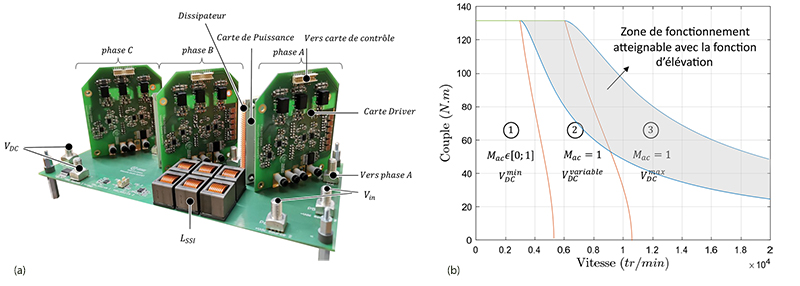Thesis by Antoine Sabrié : « Proposition et mise en œuvre d’une topologie d’onduleur multifonctionnel à tension de bus régulée pour la traction électrique » (Proposal and implementation of a multifunctional inverter topology with regulated bus voltage for electric traction).
In electric vehicle powertrains, it is necessary to convert the DC voltage supplied by the battery into three-phase AC voltages to power the vehicle's electric motor. This conversion is carried out by the vehicle's on-board power electronics, known as an inverter. This inverter is also responsible for controlling the electric motor, varying its speed or torque.
Ideally, we would like to be able to convert all of the available voltage to drive the electric motor. In reality, due to the principle inherent in inverter conversion, the motor can only be supplied with AC voltages whose maximum amplitude is 57% of the voltage value delivered by the battery. In addition to this limitation, associated with the structure of the topology used, variable voltage drops may occur in the powertrain. These can occur, for example, as a function of the battery's state of charge, or as a function of the temperature at which powertrain components operate. These voltage drops, be they intrinsic or of external origin, will reduce the performance of the machine in question.
Initially, this PhD research made it possible to study and model in detail the physical phenomena behind intrinsic voltage drops in converters. To this end, an analytical model was proposed and compared with experimental data, demonstrating a good estimation of these phenomena [1].
In industry, a solution used to overcome inverter voltage limitation is to add a DC-DC step-up converter interfaced upstream the inverter. The drawback with this solution is that it introduces a second conversion stage that can impact the powertrain’s global performance and reliability. Moreover, in recent years, new architectures have been considered to pool conversion functions and thus reduce the cost, volume and weight of the powertrain while improving its overall efficiency. As a result, single conversion stage step-up inverter architectures, without the addition of a supplementary DC-DC conversion stage, have been proposed in the literature. One of these recently emerged architectures, the SSI1, offers competitive advantages over its counterparts. Nevertheless, we demonstrated that this converter was incompatible with the electric powertrain [2]. The latter loses a degree of freedom needed to drive an electric motor, and lacks the capacity to recover energy during braking, a function that is also essential for traction applications.
To overcome these limitations, we introduced a new inverter: the B-ASSI [2]. Compatible with traction applications, it was designed and experimentally validated with a proof of concept of a few kW (Figure 1(a)). A new Pulse Width Modulation and an appropriate control law for the converter were also developed. The results show that B-ASSI offers access to more operating points and better efficiency than traditional converters (Figure 1(b)).
Finally, this research has paved the way for the addition of an inverter supply voltage step-down function, which optimizes low-speed operation, reducing inverter temperature and torque oscillations and ultimately improving the performance of the electric motor [3]. A B-ASSI extension, incorporating this functionality has been proposed and experimentally validated.

(b) Extension of the electric motor’s theoretical operating zone using the B-ASSI compared to a conventional inverter.
This research paves the way for a wider application of Split Source architectures in electric traction, while highlighting the advantages of combining several functions in a single converter to optimize the powertrain.
1- Split Source Inverter.
References:
-
A. Sabrié, A. Battiston, F. Vidal-Naquet, J. -Y. Gauthier and X. Lin-Shi, Analytical Derivation of Output Distortions Harmonics Caused by Voltage Source Inverter Non-Linearities in PMSM Drives, 25th European Conference on Power Electronics and Applications (EPE’23 ECCE Europe), Aalborg, Denmark, 2023.
>> https://hal.science/hal-04308904
-
A. Sabrié, A. Battiston, J. -Y. Gauthier, X. Lin-Shi, Three-phase bidirectional active split source inverter for automotive traction application, Mathematics and Computers in Simulation, 2023.
>> https://doi.org/10.1016/j.matcom.2023.08.045
-
A. Sabrié, A. Battiston, J. -Y. Gauthier and X. Lin-Shi, Investigation of the modulation index tuning advantages for voltage source inverters with adjustable DC-bus voltage, 23rd European Conference on Power Electronics and Applications (EPE’21 ECCE Europe), Ghent, Belgium, 2021.
>> https://hal.science/hal-03811000
Scientific contact: antoine.sabrie@ifpen.fr





